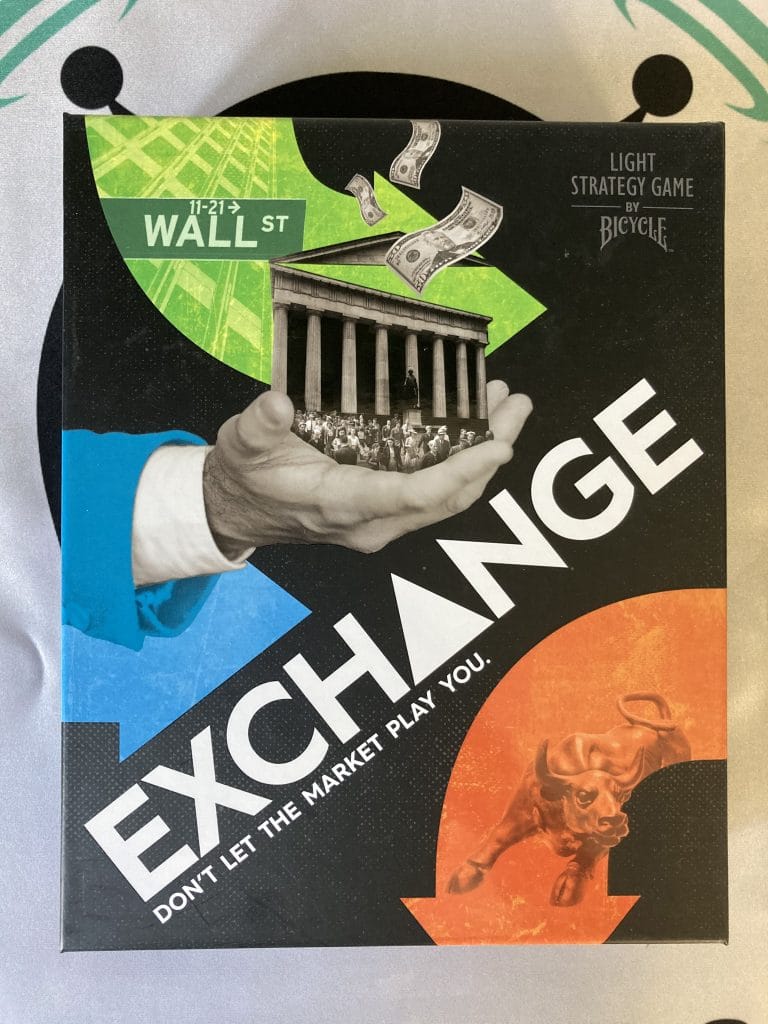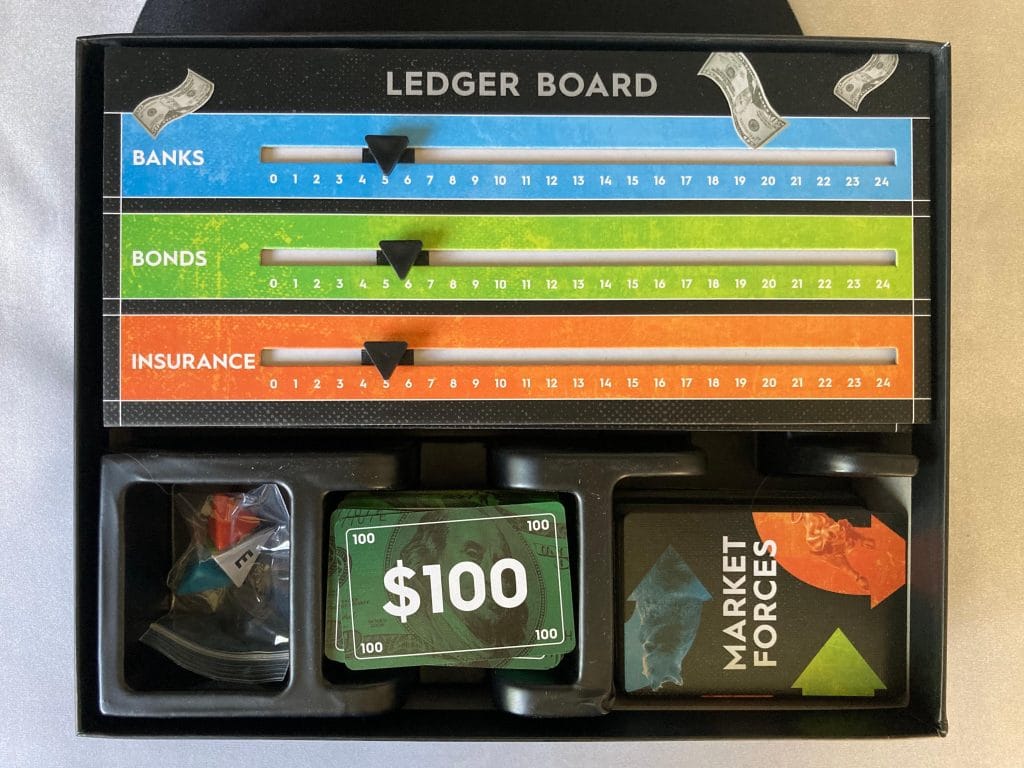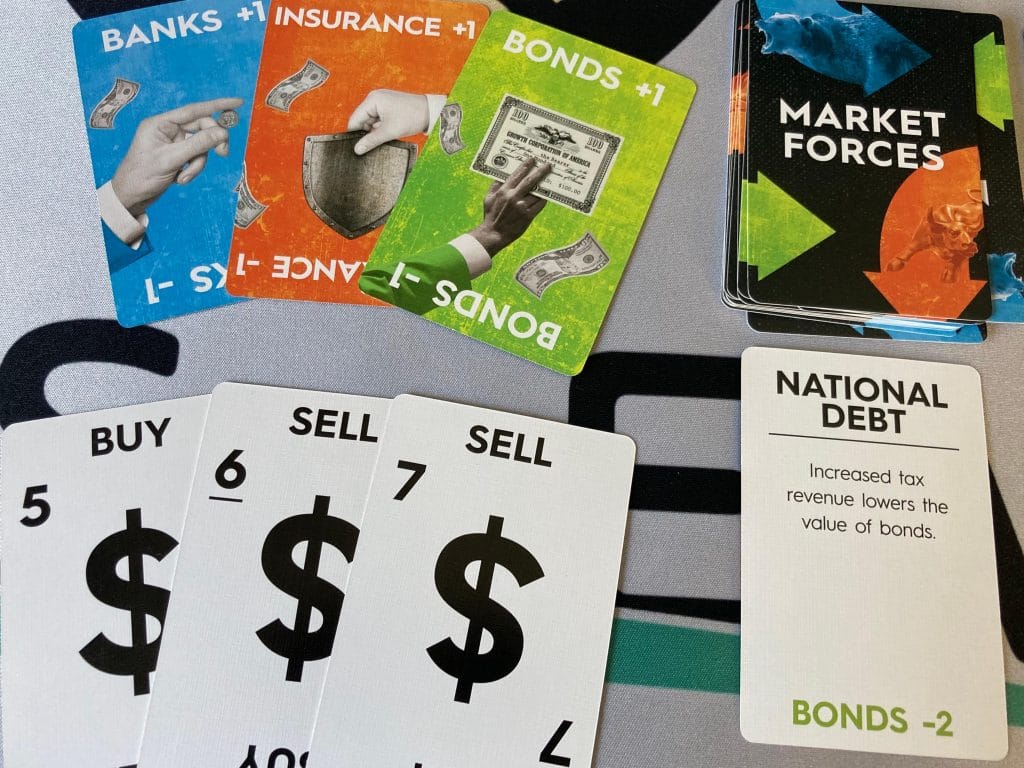
Buy low and sell high. It’s the age-old adage of any business venture, and might as well be the slogan of the New York Stock Exchange. With the endless stream of market factors, however, making that cheddar is often easier said than done.
Announced at the same time as their new light-strategy board game, The Alpha, Exchange is a board game about playing the market to make the big bucks.
But just like the real world, your opponents are trying to do the same thing as you. It’ll take some careful guesswork and strategy to come out on top. Nerds on Earth took this one for a test drive, and our thoughts are summarized below.
Exchange: Ride the Bubble
Exchange allows players to assume the roles of the founding members of the New York Stock Exchange. Then, using their hard-earned cash and wit, they buy and sell securities to increase their net worth.
Each turn consists of three phases:
- Select a Security: Players choose either Banks, Bonds, or Insurance.
- Buy or Sell: Players communicate whether they will buying or selling the chosen Security. Secretly, they also decide the quantity that will be exchanged. Hey! That’s the name of the game!
- Influence: Players choose a Security again, either to increase or decrease its value by one.
There are some interesting twists built into the game as well. For example, the player with the most cash gets control over the Lobbyist. This allows them to influence an additional Security by a value, either up or down.
Furthermore, a Market Force card is revealed each turn. This is a random effect that will impact the values of Securities as well. This increased variability ends up having quite a bit of impact on your plan as a player.
Lastly, Securities can’t increase and decrease infinitely. The entire market is surrounded by a bubble; if a Security ever drops down beyond the bubble, it jumps its value all the way to the top. Likewise, if a Security increase too high, its value plummets to the bottom.
Exchange allows players to try and figure out what everyone’s going to do in a given turn. Since all of the information is disseminated piece-meal throughout the three phases, players have to be on their toes at all times.
Staking Our C.L.A.I.M on Exchange
 Components
Components
Since Exchange is published by Bicycle, you know that there are going to be copious amounts of cards from the get-go. Bicycle knows how to do cards well, and you get exactly what you’d expect in this department.
Instead of tracking physical money with those wafer-thin pieces of paper that became popularized with board games like Monopoly, Exchange utilizes smaller cards for this purpose as well. Money values are captured in $10, $50, and $100 denominations.
However, the real value doesn’t come from your liquid assets; it comes from your Securities. Players track these on thick cardboard ledger boards, with a plastic sliding marker to move up and down the track. It’s a nice touch that gives players something physical to have in front of them.
Additionally, players will slot their decisions for each phase into little card sleeves. Not only does this signal that a choice has been made, but it also conceals information like the quantity being bought or sold in Phase II. It’s an intentional design choice that works well for this type of game.
You’ll also get three four-sided dice to mark the values of the different Securities on the cardboard Market Value Board.

 Luck
Luck
Since the Exchange board game is a deduction-based game, luck plays very little role in your decision-making as a player. Everything that happens is the result of the influence other players have on the game-state.
Some people could argue that the game is hardly more than random; how can you possibly anticipate how the market is going to shake out each round? The key lies in keeping tabs of players’ ledgers, the value of the Securities, and the Securities that people are going to buy/sell.
All of this information is open and available, right there on the table. Seeing a player displaying that they’re going to Sell Insurance indicates that you may want to influence that. However, if they only have a couple shares to their name, maybe you should focus on influencing another Security?
There’s a balance between hyping and increasing the value of your own interests while planning ahead to the next round. After all, markets don’t necessarily change today based on the decisions made today. Yesterday has an impact on tomorrow, and it’s up to you to anticipate those outcomes.
 Aesthetics
Aesthetics
Because of how the game plays, there isn’t much real estate for card art. Most of the time your cards are half-hidden in the sleeves, which means that things are going to be more simple. No sense in spending more production money on something that will be rarely seen.
Luckily, that doesn’t mean that the Exchange board game is ugly. In fact, it shines with its simplicity. The green, orange, and blue hues pop off the dark contrast of speckled black boards. Grayscale hands and dollar bills are really all that you need. It all complements itself in an aesthetically-pleasing way.
Again, the point of the game requires that information is easily visible and able to be interpreted across the table. Bicycle accomplishes this with associative design choices and a bold typeface.

 Interest
Interest
Just like The Alpha, Exchange benefits greatly from having a full table of players. This isn’t a game that you can just pick up and play with two people, and I don’t necessarily think that three would be the best player count either. But once you get four people playing together, that’s when the fun is really going to start.
This board game is great for people who like anticipating outcomes. There’s only so much that you can affect as an individual player. Instead, you have to deduce what other players plans are. Are they selling a lot of Bonds? Will I be able to get rid of my Bank Securities before the bubble bursts?
In a way, this game features some indirect ‘take-that’ mechanics in respect to the bubble. However, the bubble is also its own catch-up mechanism. If too many players try to pile on the same player by lowering the value of that security, they might lower it too far, sending it right to the other side of the bubble.
There is some minor multiplication that you’ll have to do on the fly, although it shouldn’t be much trouble. The Exchange board game is rated for ages 10+, which can help disguise math as a game for younger players. I’m always an advocate for board games as teaching tools, so the combination of a historical background, portfolio diversification, and math can be a good angle to take from that perspective.
 Mood
Mood
Let’s be honest: buying and selling Securities isn’t really the most glamorous and exciting thing in the world. Bicycle took a concept of buying and selling and added this smart bubble mechanic to introduce tension into the game.
You can almost feel the sweat beginning to bead on your forehead when those Securities are right on the edge of boom or bust. Honestly, without the bubble Exchange wouldn’t be much of a game at all. It’s the bubble that makes this board game worth playing.
Destroying the value of someone’s Securities isn’t going to totally destroy friendships, but just remind them that the market is volatile. Playing the game is a risk, just like all those reminders on stock-trading sites that high returns are certainly not guaranteed.
Exchange: Diversify Your Portfolio
In summation, the Exchange board game is a lesson in risk tolerance and deduction. It’s not an engine-builder where you can strategically build towards a final goal over the course of a game. It’s also not a game where your fate is beholden to the results of dice rolls. Exchange is just as much a game about people as it is about the greenbacks.
If you’re interested in Exchange, you can add yourself to be notified of the game’s release or you can wait for it to show up at your Friendly Local Game Shop (FLGS).
[Disclosure: Nerds on Earth received a copy of Exchange from the United States Playing Card Company (Bicycle) in exchange for an honest review.]

